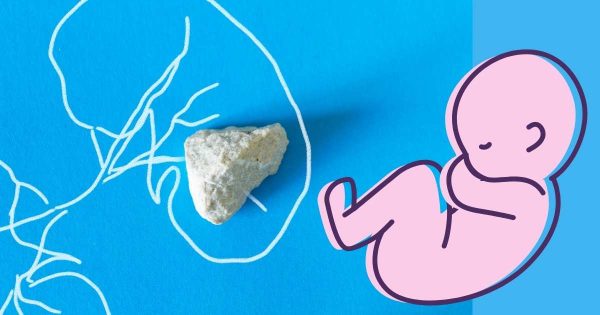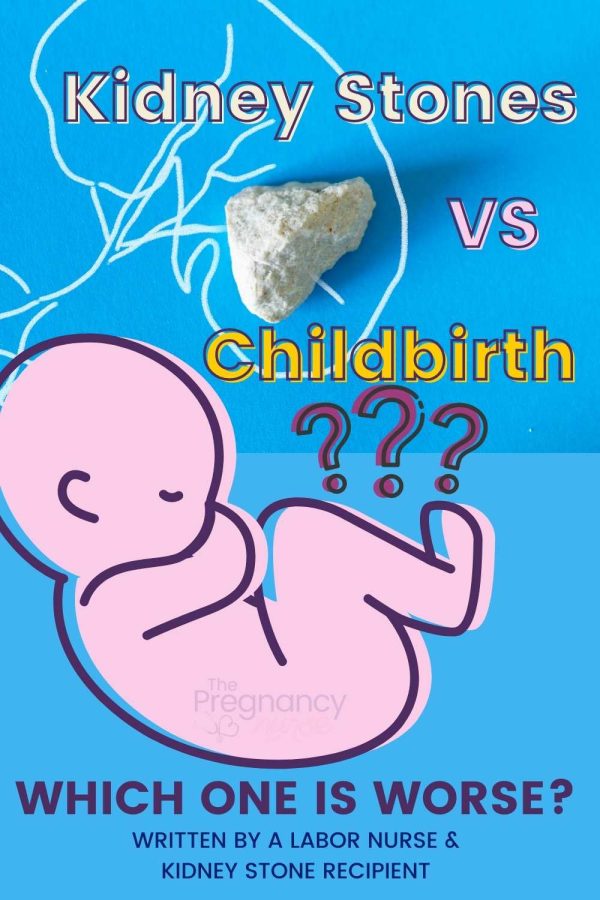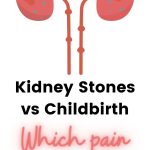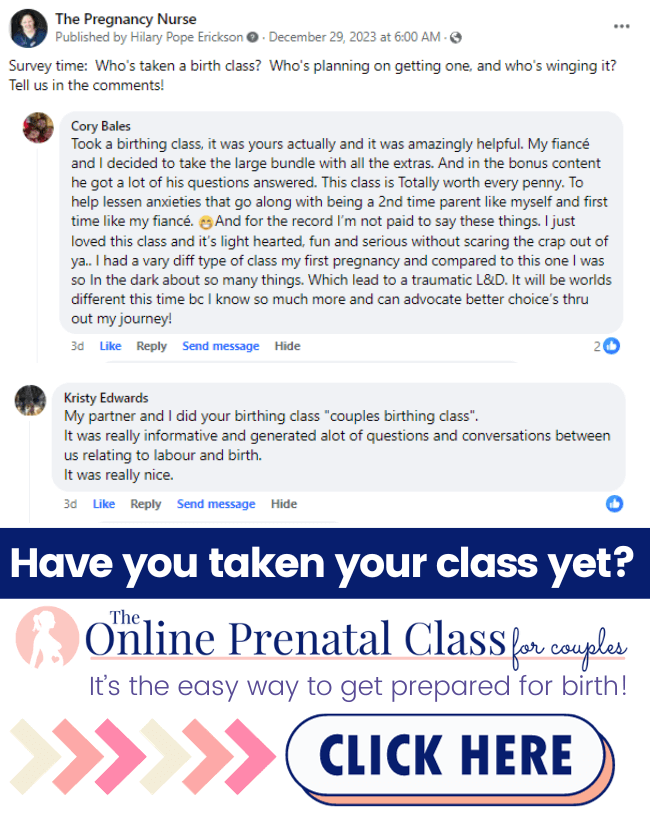👋 I’m so glad YOU are here. Are you looking to also get your partner prepared? This is for BOTH of you. Couples just love it and I know you want to both feel prepared!
Is kidney stone pain worse than childbirth? What is, in fact, the worst pain out there? Today we’ll answer the questions with an experienced kidney stone creator as well as L&D RN. Let’s answer this question of the worst pain for once and for all. 🙂
The intense pain of Kidney stones can be really hard. But, is it harder than labor? Today I’m here to share how they’re the same or different. Also, did you know that kidney stones are very common during pregnancy for a variety of reasons.

Before we get started, how do I know so much about kidney stones?
Hi, I’m Hilary — The Pregnancy Nurse 👩⚕️. I have been a nurse since 1997 and I have 20 years of OB nursing experience, I am also the curly head behind Pulling Curls and The Online Prenatal Class for Couples. 🩺 I have experienced both childbirth pain, and kidney stone pain — so I am a good source for information on this.
Ok, let’s answer that first big question:
Is a kidney stone the same pain as giving birth?
Pain from the backup of urine due to kidney stones is very similar to contraction pain. I would put them on par with each other. However, kidney stone pain can easily be treated with Toradol or Morphine (if you’re not pregnant) but treatment of childbirth pain is more complicated.
Want to learn more about pain management during labor << I have a ton of posts on it.
But I think you need to understand a bit more about kidney issues during pregnancy. We’re also going to review why kidney stones happen, how to prevent them and talk more about how the pains are similar and different.
Urinary Tract Issues During Pregnancy
Your urinary tract is a prime candidate for issues during pregnancy. Because the bladder is so close to your uterus, it can be pretty annoying.
In fact, it’s really common to get a urinary tract infection during pregnancy. It’s for a variety of reasons, but mainly because, as the uterus grows, it tips the bladder in a different way which can make emptying it more different. That means that older urine just sticks around in there and can grow bacteria.
That, combined with hormone changes, changes in blood flow/volume makes your urinary tract a place where you might get an infection, even if you haven’t previously.
The good news, is that a UTI is very treatable with antibiotics during your pregnancy (and the medications are safe for baby too).
Kidney Stones While Pregnant
Because of ALL of this, pregnancy is also a risk factor for getting kidney stones. In fact, a study in April 2021 in the American Journal of Kidney Diseases showed that your risk of kidney stones starts to increase in your second trimester, and peaks at about 0-3 months after delivery. Although, you still do have an increased risk up to a year after delivery – and even beyond.
It’s crazy that the incidence of kidney stones is so much higher (especially for so long!).
I would guess that this is all due to that baby adjusting how the urine flows through the kidneys with all the extra contents of your abdomen during pregnancy. Also, because the chance of dehydration during pregnancy is so much higher.
Both UTI’s and kidney stones can cause severe pain (especially during pregnancy — I personally find the pain to be worse when I’m pregnant likely because the uterus starts contracting as well), and can be a risk factor for preterm labor, so it is something that your provider should take very seriously in pregnant women. It is something that would prompt medical attention in the labor and delivery unit frequently.
Of course, you are also at a higher risk for yeast infections, and vaginitis as well due to changes in hormones and vaginal blood flow. Basically, that whole area is just a mess.
The symptoms of a kidney stone may mask themselves as labor as well. They might think it’s “back labor” and think that the baby is coming. So, there’s just a lot to consider about it, along with any other health issues it can contribute to.
And yes, we talk about ALL of these changes of pregnancy in here. It’s SO helpful, and FAST!
My Experience with Both Kidney Stones and Labor:
Before we get started, I want to let you know that I am a survivor of both kidney stones and labor. And, I have lived to tell the tale. 🙂
I have also seen MANY patients who have gotten kidney stones during their pregnancy as their nurse, so I have seen this from a variety of angles.
My first time having a stone was actually after a shift at work. I kept thinking that I had pulled my back muscles or something at work (it happens) but then it kept getting worse, until I started throwing up. I was not pregnant with my first stone (I think we can thank not drinking anything at work for that one).
Ultimately, I went to the emergency room where I waited forever to see someone. I will say that was one of the most painful experiences of my life. Mostly because I realized what it was and I just had to sit in the ER and wait.
When we’re ignored it can make us experience pain in a worse way right?
On that day, the pain of kidney stones was a HARSH ache in my back, most likely due to a backup of urine. I also felt a strong urge to urinate about every 3 minutes (as the stone was sitting on top of my bladder and blocking the flow of urine plus hitting my bladder making me think I needed to pee).
I went for a CT scan (most people call this a CAT Scan) to see how large it was, and they decided it was likely small enough that it would pass on its own as long as I pushed a lot of fluids. It would hopefully not require medical intervention. They hydrated me (increasing fluids actually helps it feel better, which seems unlikely).
I went home with a urine strainer and was instructed to use that with each urination event. I did finally pass the stone, after a friend of mine mentioned to bear down each time I peed to really speed up the flow of urine as it came out. That seemed to do the trick (in addition to drinking a TON of water). It took about 24 hours total.
Kidney Stone Passing Tip: Bear down as you pee (like you’re pushing out a BM) and the added pressure may help the kidney stone pass. You should NOT do this routinely though as it’s not great for your pelvic floor.
They tested the stone and decided it was calcium oxalate, the most common type of stone.
My second two bouts of stones were during my pregnancy. The pain of kidney stones is harder during pregnancy. When your abdomen is already so full and your urinary tract is already smooshed around it seems to make it worse.
Also, you’re not as sure if pain medication is a good idea. However, most often if you’re in a TON of pain it’s better to get rid of that pain, otherwise your uterus might want to get into the act as well. And a small dose of pain medication is better than going into preterm labor.
The next time it wasn’t as bad, and I actually passed the stone in labor and delivery. Both times they hooked me up to IV fluids, and gave me some morphine, I believe. I didn’t get a CT scan but I did end up having an ultrasound ordered on a later date, and they did see some stones in my kidneys.
While only about 10% of people suffer with a kidney stone being problematic, it sounded like most people do have some small stones (often like a grain of sand) in their kidneys that pass now and then. Hopefully they’re small enough to not cause an issue (unlike mine). And, like with all things, different people feel the pain of kidney stones (and even the pain of labor) in different ways.
Why are Kidney Stones Painful?
It’s not actually HAVING the stones that are painful (most people have some stones in their kidney) the pain from kidney stones starts once you begin to pass them.
- You can have pain from the stone moving in the kidney
- You can have a back-up of urine as the stone stops that flow into the bladder (this is usually the main culprit)
- You can also have bladder pain if the stone is close to the bladder and irritating it
- You can have pain closer to your urethra as the stone moves out of the bladder into the toilet (we hope)
Kidney stones really are painful because your kidneys are an intricate system that needs to run in just the right way to get all those toxins and things you don’t need out of your blood. When stuff (like a stone) gets in the way it really messes stuff up.
Kidney Stones vs Childbirth Pain
Since I’ve felt both, let’s talk about the similarities and the differences of kidney stone pain vs labor pain.
Ways Kidney Stones & Childbirth Pains are Similar
Both pains are severe pain. Most people rate them 9 or 10 out of ten. Often they cause us to do things out of our norm and look for relief. Many people show up with stone pain at the emergency room. Symptoms of kidney stones or natural childbirth can include nausea/vomiting, and shaking from the pain. That’s just how the human body reacts.
Both stones and the pain of childbirth can come on gradually or affect you all at once.
The pain of stones or labor pain can also vary. Labor can start as some mild cramping, and pains with stones, especially a small stone, can feel similar.
Both Pains can also come in waves of pain. The pain will go away between contractions, and kidney stone pain may abate for a bit as well.
However, much like childbirth, if you progress, or if you have a large stone the pain can be one of the most painful things you will experience.
In both cases pain management is an option. With kidney stones I was offered Toradol or Morphine, and in labor you can use IV medications or an epidural.
The good news for both types of pain is that once the stone or the baby/placenta is out, the pain relief is almost immediate. If you’re in good overall health you can resume regular activities immediately with stones. However, your body needs a longer healing time with a baby (but the pains will mostly be gone).
In a somewhat similar situation, if a patient has larger stones they will likely not pass on their own. First, they will try Lithotripsy where they send shock waves into your body to try to break up the stone. If that doesn’t work they may try a surgical intervention, often percutaneous nephrolithotomy (where they cut the stone out).
And, in pregnancy, that would be similar to a cesarean section of a baby that can’t pass on it’s own.

Ways the pain is different
Of course, one is a baby and one is a stone – so the source of the pain does cause some acute differences.
While painful kidney stones can be an abrupt start to pain, pregnancy could have been painful for the months leading up to the event. In addition to the pain of the delivery, lots of people may have also experienced:
- Morning sickness
- Ligament pains
- “False” labor contractions for weeks
- UTI’s
- “Lightening crotch”
(and yes, we talk about all of that stuff in here)
However, with kidney stones, you have involvement in a system that could have serious consequences (vs the human body being created to have a baby).
A lot of people experience shock waves of pain due to the flow of urine out of the kidney being blocked. Those go through flank pain, bladder (or lower abdomen) pain, renal colic, and more.
But, with a kidney stone, there is no issue asking for pain relief. No worry that you’ll forget the event (you’ll want to) or that you’d like your body to do this “naturally”.
With kidney stones, there are lots of types of kidney stones. They may ask you to strain your urine to grab any stone that comes out and test for what it is.
- Calcium Oxalate stones are the most common type.
- Struvite stones form due to a urinary tract infection and can grow quite large.
- Uric Acid stones can form in people who are dehydrated or eat a high-protein diet.
- Cystine stones are caused by a genetic disorder that causes people to excrete too much cystine (an amino acid).
With a baby, you have to then go on to raise the baby. Thankfully, the stone you can just flush or toss in the trash.
Fun fact: A study showed that a roller coaster may be a helpful aid in getting rid of a stone. I just can’t imagine being in the pain of a kidney stone while being on a roller coaster, that sounds miserable.
While the pain of contractions and kidney stones are similar, I think there is one big difference in the pain when the item comes out.
Babies have to stretch your birth canal and often patients feel the “ring of fire” at the end. There is a huge amount of pressure as the baby comes out. Ultimately, that is likely the most acute pain (although, thankfully short-lived) of childbirth, and worse than kidney stone pain.
In addition to the pain of labor, there is a mental load of big things happening in your life of learning to take care of this baby, breastfeed, be a parent. All those things. None of those are weighing on you with kidney stones. All you can think is to get it out.
Verdict on Childbirth vs Kidney Stones:
The pain of labor is worse due to the baby’s exit as well as a mental load of the delivery of your baby (and that being a big life change).
However, because kidney stone pain is more unexpected it can be scarier because you’re not sure what it is wrong, and you may not be sure of the source of pain.
Ways to Prevent Kidney Stones in Pregnancy
There are lots of ways to prevent stones in general, and during pregnancy. Patient education after a bout with stones is important, so they can prevent stones from happening in the future. When I had mine, the ER doctor very patiently went through quite a lot of teaching of things I could do to prevent them in the future. Things mentioned:
- Make sure I’m drinking enough water – it helps to flush out small stones without pain and also reduces kidney stone formation in general. It also improves your kidney function.
- Stop calcium supplements – since my stone was calcium oxalate, it is possible that calcium tablets could increase my risk for those.
- Frequent urination – always good for your urinary tract, it also helps prevent the backup of urine into the kidneys.
- Drink lemonade to help your urine stay more acidic and break up stones easier.
If you have kidney stones, be sure to speak with your provider about ways that you can specifically help them in your body.
Are kidney stones more painful than childbirth? FAQ’s
It can feel similar to when you pull a back muscle, or pain similar to food poisoning or contractions but in your back (vs most stomach/uterine pain is felt in your front).
Some people who have back labor may think that they have kidney stones, but back labor is usually on both sides rather than just on one side like a kidney stone often is.
I don’t know, but personally –as a nurse, I think the worst pain is felt by burn victims on a burn unit as they change dresses. As that has to be done daily or even more frequently, that is probably the worst pain I think there is.
Both are measured on the same pain scale, and most people put them at about a 9, but it is ultimately impossible to tell how painful something is as you compare person to person — so we have to take their word for it.
Yes, but it is felt more in the back than the front. Your kidneys are in your “flank” area (the fattier part of your back about 3 inches to the side of your spinal column). Your uterus (and contraction pain) is below your bra-line during later pregnancy.
One word: parenting. It’s just a different kind of pain. 🙂 Lots of joy along the way too.
If you’re pregnant, please consider checking out The Online Prenatal Class for Couples. It is:
- Taught by a nurse with over 20 years of experience.
- Quick — it can be done in just a few hours.
- Engaging — taught by a nurse who is a great TEACHER in addition to having lots of experience.
Want to do a vibe check before diving into the whole thing with me? — check out my free labor pro tips. It’s your first step toward getting in the driver’s seat of your birth.





 Can You Use a Heating Pad While Pregnant?
Can You Use a Heating Pad While Pregnant?
